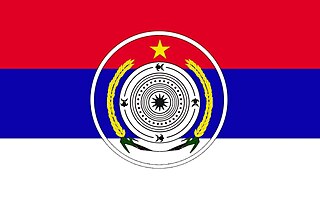
Myanmar is divided into 21 administrative divisions, which include seven regions, seven states, one union territory, one self-administered division, and five self-administered zones.
The Panglong Conference, held in February 1947, was a historic meeting that took place at Panglong in the Shan States in Burma between the Shan, Kachin and Chin ethnic minority leaders and Aung San, head of the interim Burmese government. Aung Zan Wai, Pe Khin, Bo Hmu Aung, Sir Maung Gyi, Dr. Sein Mya Maung and Myoma U Than Kywe were among the negotiators of the historical Panglong Conference who negotiated with Bamar representative General Aung San and other ethnic leaders in 1947. All these leaders unanimously decided to join the Union of Burma. On the agenda was the united struggle for independence from Britain and the future of Burma after independence as a unified independent republic.

Insurgencies have been ongoing in Myanmar since 1948, the year the country, then known as Burma, gained independence from the United Kingdom. The conflict has largely been ethnic-based, with several ethnic armed groups fighting Myanmar's armed forces, the Tatmadaw, for self-determination. Despite numerous ceasefires and the creation of autonomous self-administered zones in 2008, many armed groups continue to call for independence, increased autonomy, or the federalisation of the country. The conflict is the world's longest ongoing civil war, having spanned more than seven decades.

The Shan State Army, also known as the Shan State Army - South (SSA-S), is the armed wing of the Restoration Council of Shan State (RCSS) and one of the largest insurgent groups in Myanmar (Burma). The RCSS/SSA was led by Lieutenant General Yawd Serk until his resignation on 3 February 2014. Yawd Serk was reelected chairman of the RCSS shortly after his resignation and has remained chairman since.

The Communist Party of Burma (CPB), also known as the Burma Communist Party (BCP), is a clandestine communist party in Myanmar (Burma). It is the oldest existing political party in the country.

The Kayan New Land Party is a political party in Myanmar. Its armed wing is Kayan New Land Army.
Ceasefires in Myanmar have been heavily utilized by the Burmese government as a policy to contain ethnic rebel groups and create tentative truces. The first ceasefire was arranged by the State Law and Order Restoration Council in 1989, specifically spearheaded by Khin Nyunt, then the Chief of Military Intelligence, with the Kokang-led National Democratic Alliance Army, which had recently split from the Communist Party of Burma due to internal conflicts.

The Palaung State Liberation Front is a political organization in Myanmar. Its armed wing, the Ta'ang National Liberation Army (TNLA), has between 10,000–15,000 members as of 2023.

The United Nationalities Federal Council is a coalition of five opposition groups in Myanmar. In 2011, the council was formed by 11 opposition groups that campaigns for the rights of various ethnic minorities in Myanmar. Six of the UNFC's members have successfully made or are in the process of making peace negotiations and permanent ceasefire agreements with the government. The group's armed wing is the Federal Union Army (FUA).

The communist insurgency in Burma was waged primarily by the Communist Party of Burma and the Communist Party (Burma) from 1948 to 1989. The conflict ended when the CPB, severely weakened by an internal mutiny, disbanded its armed wing.

The United Nationalities League for Democracy was a political alliance in Myanmar.

The Federal Union Army is a military coalition in Myanmar (Burma) composed of fighters from various insurgent groups which are members of the United Nationalities Federal Council (UNFC). It was established by the UNFC to protect areas with ethnic minorities.

The People's Defence Force is the armed wing of the National Unity Government in Myanmar. The armed wing was formed by the NUG from youths and pro-democracy activists on 5 May 2021 in response to the coup d'état that occurred on 1 February 2021 that put the military junta and their armed wing the Tatmadaw in power. The military junta designated it as a terrorist organisation on 8 May 2021. In October 2021, NUG's Ministry of Defence announced that it had formed a central committee to coordinate military operations across the country.

The Myanmar civil war, also called the Burmese Spring Revolution, Burmese civil war or People's Defensive War, is an ongoing civil war following Myanmar's long-running insurgencies, which escalated significantly in response to the 2021 military coup d'état and the subsequent violent crackdown on anti-coup protests. The exiled National Unity Government and major ethnic armed organisations repudiated the 2008 Constitution and called instead for a democratic federal state. Besides engaging this rebel alliance, the junta also contends with other anti-junta forces in areas under its control. Hannah Beech of The New York Times observed the insurgents are apportioned into hundreds of armed groups scattered across the country.
This is the list of important events happened in Myanmar in 2023.
The National Unity Consultative Council is an advisory body of the National Unity Government of Myanmar. Formed in response to the 2021 Myanmar coup d'etat, the NUCC seeks to overthrow the military dictatorship and build a federal democratic union in Myanmar through collective leadership, political dialogue, and coordination. NUCC is a historic alliance of ethnic armed organizations and the Bamar majority, and is considered one of the most inclusive in modern Burmese history.